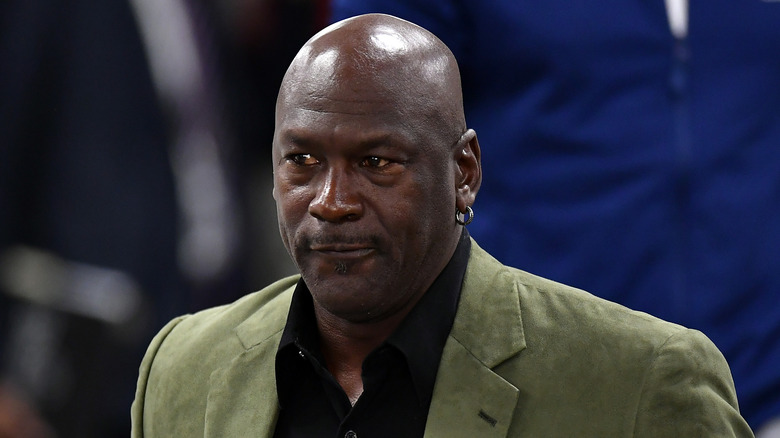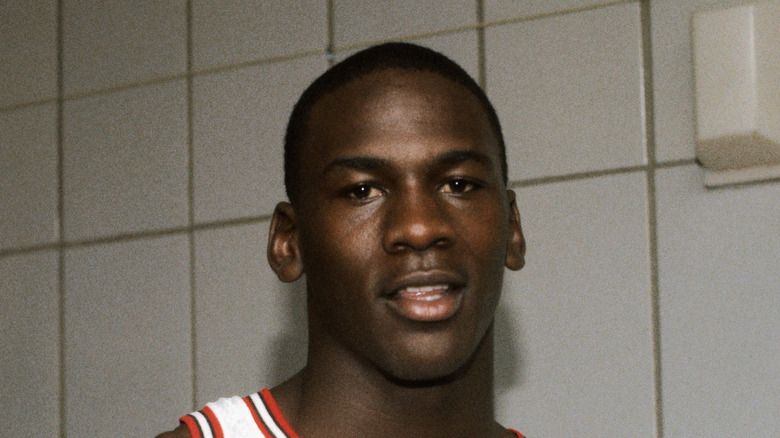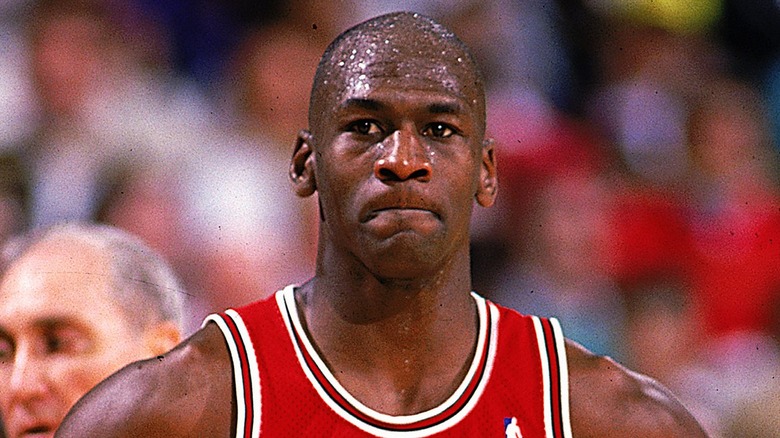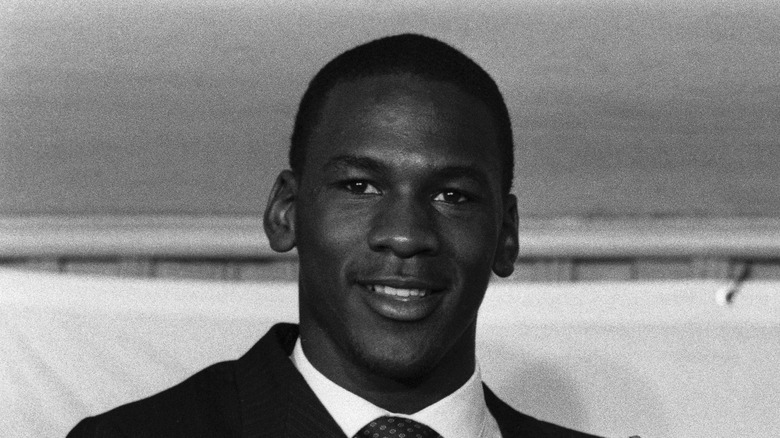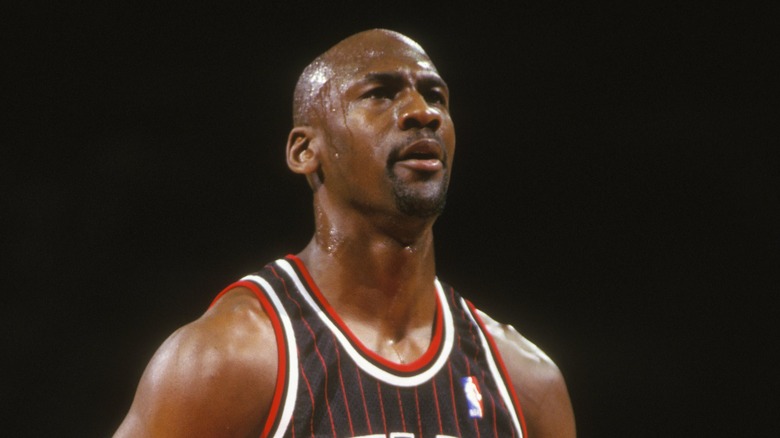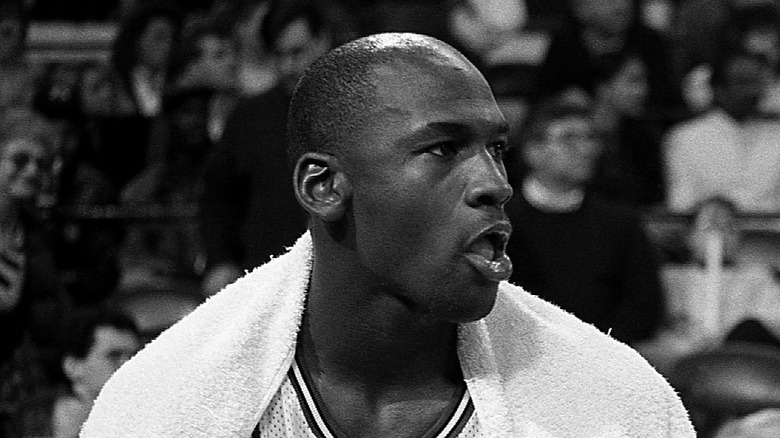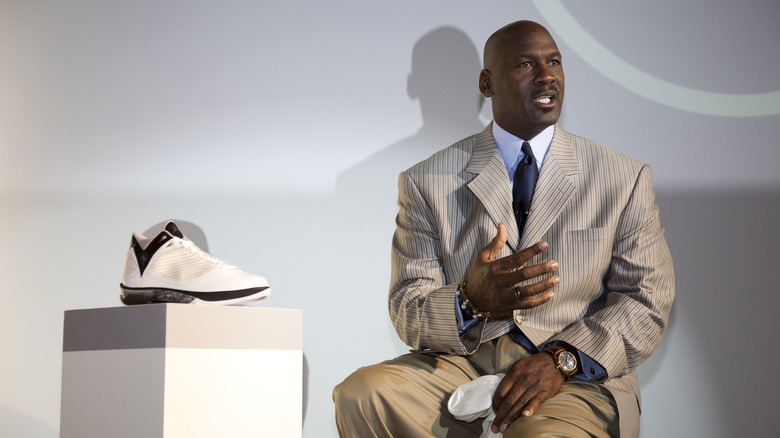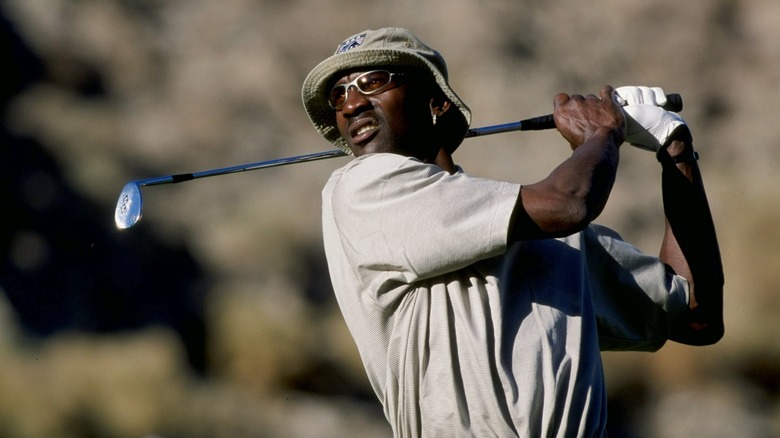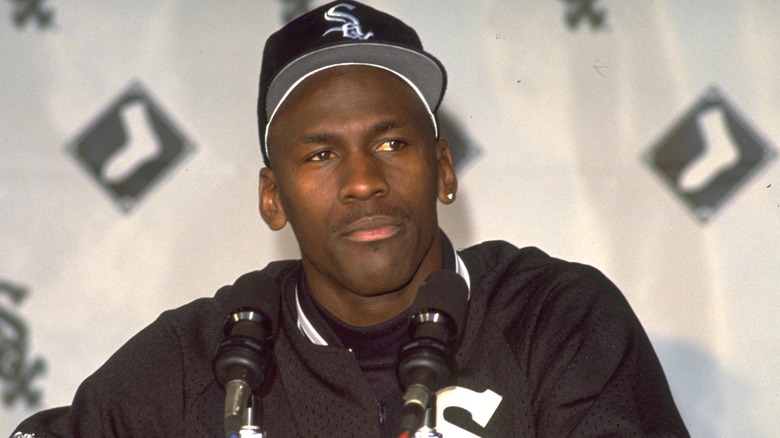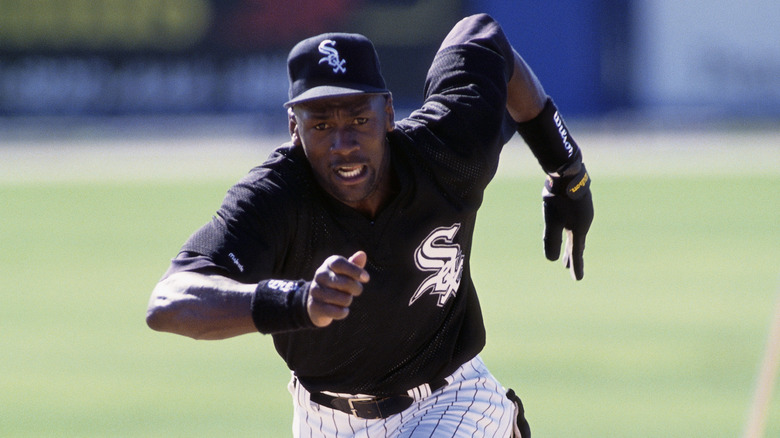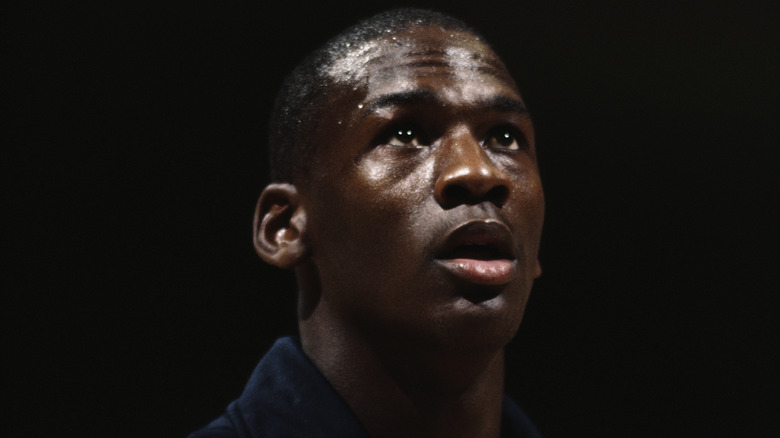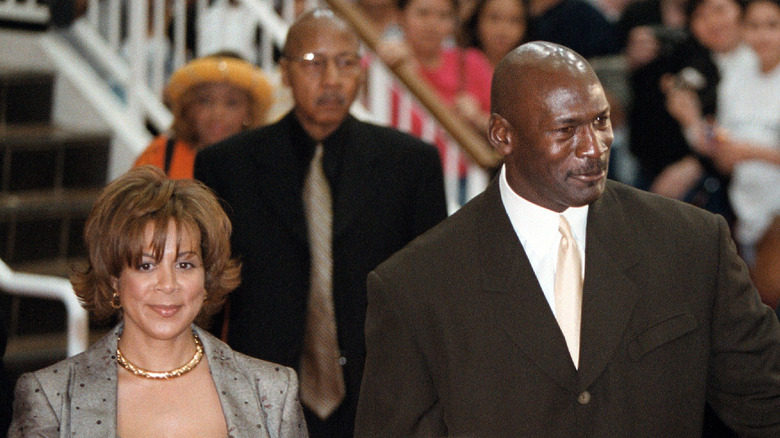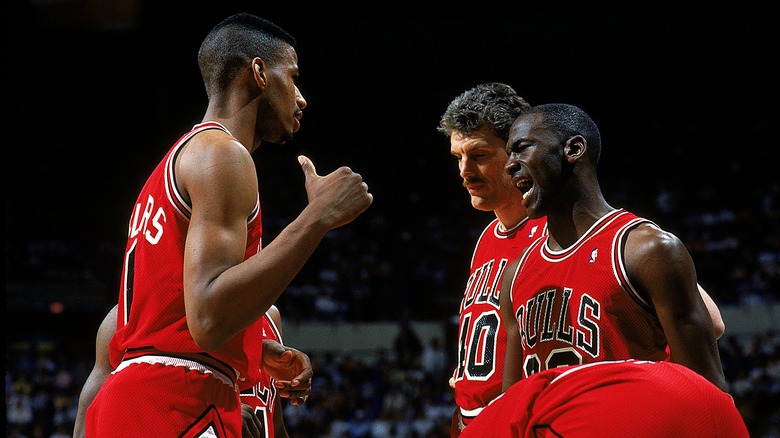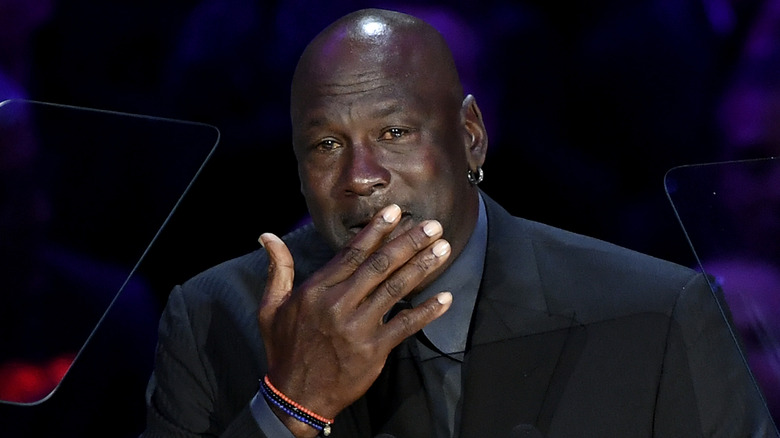Tragic Details About Michael Jordan
Michael Jordan is one of the few elite athletes in the world to have truly reached the absolute apex of his sport. That's evident in his record with the Chicago Bulls, leading the team to two consecutive "three-peat" NBA championships — only to retire, return to the Bulls and do it all over again to rack up three more, also won during three straight seasons. Along the way, he's been named league MVP five times, ranked as the No. 1 athlete of the 20th century by no less an authority than ESPN, won two Olympic gold medals, and co-starred with Bugs Bunny and Bill Murray in the hit movie "Space Jam."
Jordan has also proved to have a canny eye for business. His longstanding partnership with Nike to produce his monstrously successful Air Jordan sneakers has brought him unfathomable wealth, estimated at being in excess of $1.5 billion — and that's not counting the millions more he's earned from his basketball career. He then segued from superstar basketball player to team owner, pocketing even more when he sold his controlling interest in the Charlotte Hornets for a staggering $3 billion in 2023.
Yet amid all that success and adulation, he's experienced the darker side of life. He's lost loved ones, experienced racism, endured scandal, felt the sting of divorce, and has been forced to come to terms with regret. To find out more, read on to explore some tragic details about Michael Jordan.
He helplessly watched his childhood friend drown
Michael Jordan may have been a fearless competitor on an NBA basketball court, but he's had a lifelong phobia about swimming due to a tragic childhood accident. John Salley, Jordan's former Chicago Bulls teammate, offered details after telling VladTV that Jordan can't swim, and is terrified of getting into the water. "He had a bad situation," Salley explained, "his best friend died drowning and all of that."
Jordan himself discussed the incident in an interview with Playboy. "I went swimming with a close friend one day, and we were out wading and riding the waves coming in. The current was so strong it took him under and he locked up on me. It's called the death lock, when they know they're in trouble and about to die. I almost had to break his hand. He was gonna take me with him," Jordan sadly recalled, as reported by Ballislife.com. Asked if he had been able to save his friend from drowning, Jordan confirmed that he had not. "No, he died," he replied. "I don't go into the water anymore."
According to Jordan, his friend's drowning death occurred when he was quite young, estimating he was seven or eight years old at the time. The trauma of helplessly watching his childhood friend drown has lingered with him, leaving Jordan with an ongoing fear of water that has, seemingly, been the one thing in his life he's not been able to conquer.
He experienced racist hatred
Growing up in North Carolina during the 1970s, Michael Jordan was no stranger to racism. In Roland Lazenby's 2014 biography, "Michael Jordan: The Life," Jordan recalled being in school when a white girl called him the N-word. "So I threw a soda at her," said Jordan, as excerpted by NBC News.
That retaliatory hurled soft drink wound up earning Jordan a suspension from school. As he recalled, the whole thing made him so angry that he decided that if white people were going to treat him in a racist manner, he was going to respond in kind. "I was really rebelling," he said. "I considered myself a racist at the time. Basically, I was against all white people." Obviously, Jordan's feelings evolved; however, it's easy to draw a connecting line between that childhood incident and his response, decades later, to the shocking 2020 murder of George Floyd. "I stand with those who are calling out the ingrained racism and violence toward people of color in our country," he said in a statement, as reported by Aljazeera. "We have had enough."
Furthermore, Jordan announced plans to donate $100 million to organizations that combat racism. "We have been beaten down [as African Americans] for so many years," Jordan subsequently told the Charlotte Observer. "It sucks your soul. You can't accept it anymore. This is a tipping point. We need to make a stand. We've got to be better as a society regarding race."
He endured abusive treatment as a child
Michael Jordan's family situation was largely stable, yet his childhood was no picnic. His mother, Deloris Jordan, recalled Jordan being suspended from school for fighting. Rather than let him sit around the house and watch TV during his suspension, she instead took him with her when she went to work at a bank, forcing him to sit in her car all day long and read. "I could see him from the bank window. I wanted him to know I was always watching him," she told ESPN. "He tells me it would be considered child abuse today," she said, pointing out that her tactic worked. "We didn't have any more trouble from him after that," she said.
While it may be debatable whether that actually constituted abuse, what isn't is the tough treatment that Jordan received from his father, James Jordan. The NBA star's brother, Larry, recalled their father once asking Michael to bring him a specific type of wrench. When he didn't know what it was, his father disparaged him. "And my father just sent him in: 'Go back inside with the women,'" Larry Jordan recalled for ESPN.
"It was my father's early treatment of him and Daddy's declaration of his worthlessness that became the driving force that motivated him," Michael's sister Deloris, who goes by Sis, said in "Michael Jordan: The Life," excerpted by the Daily Mail. "Each accomplishment was his battle cry for defeating my father's negative opinions of him."
His college girlfriend drowned in a flood
Remembrances of Michael Jordan's years attending The University of North Carolina at Chapel Hill are typically those that recount his numerous triumphs on the basketball court. However, it was also a period when he experienced the tragic death of someone to whom he was very close.
"I mean, my girlfriend got swept away in a flood and drowned when we were in college," Jordan told Vanity Fair in a 1998 interview. Ruminating on the fragility of life, he philosophically added, "How can you say there isn't a plan for all of us?"
While Jordan didn't specifically reference his girlfriend's death by drowning as contributing to his well-established fear of going into the water, it's certainly not a stretch to assume that it may have indeed played a role. In any case, it's a fear that was still very real to him when he was interviewed by Playboy back in 1992. "Now I ain't going near the water," he said at the time, via Ballislife.com. "I can't swim and I ain't messing with the water."
A foot injury during his rookie season nearly derailed his NBA career
Michael Jordan had shone in college basketball, then went on to win a gold medal at the 1984 Olympic games as a member of the U.S. basketball team. Not surprisingly, expectations for the young athlete were sky-high when he was drafted by the Chicago Bulls later that year.
That promising NBA career, however, was nearly derailed in 1985 when Jordan suffered a severe injury to his foot, just three games into his second season. As the Chicago Tribune reported, Jordan fractured a bone in his left foot, and would be out of commission for at least six weeks to recover. ”When I heard it was cracked, that really hurt me," he said. "What do I do from here? Six weeks of nothing?” However, he was hopeful that his being out would force his teammates to elevate their own gameplay during his absence. "Maybe it's time for the Chicago Bulls to win without Michael Jordan," he said. "Something good has got to come out of this. I just can't see it right now.”
As the documentary "The Last Dance" subsequently revealed, doctors estimated the bone would need at least 18 months to fully heal, telling Jordan there was a 10% chance his career would be over if he returned to the court too soon. "And I just lost it," Jordan recalled. "I said, 'Look, it's a 10% chance, but it's a 90% chance that I won't."
A teenager's murder over a pair of Air Jordans left him devastated
Michael Jordan's association with Nike's Air Jordans has made him a ridiculously wealthy man, to the tune of an estimated $1.6 billion as of 2023. Yet all that success has not come without some tragedy.
As Slate detailed, back in 1990, Jordan was approached by Sports Illustrated journalist Rick Telander before a Chicago Bulls practice. Telander related the story of Michael Eugene Thomas, a 15-year-old Black teenager who was murdered by a 17-year-old friend — who killed him in order to steal his prized Air Jordans. "I can't believe it," Jordan told Telander as he contemplated the heinous killing. "Choked to death. By his friend." While Jordan appeared to be close to tears, the athlete became even more distraught when Telander let him know that it had not been an isolated incident, that there had been an epidemic of killings over Jordan's coveted Nikes.
Those incidents came to give Jordan pause. "I thought I'd be helping out others and everything would be positive," he told Sports Illustrated at the time. "I thought people would try to emulate the good things I do, they'd try to achieve, to be better. Nothing bad. I never thought because of my endorsement of a shoe, or any product, that people would harm each other. Everyone likes to be admired, but when it comes to kids actually killing each other," he added before pausing and continuing, "then you have to reevaluate things."
He's lost so much money gambling that he was investigated by the NBA — twice
During the early 1990s, rumors began swirling around Michael Jordan involving his gambling. What made the rumors particularly troubling was that they involved massively large amounts of money — enough to attract the scrutiny of the NBA. In fact, the league undertook not one but two internal investigations into Jordan's gambling, although neither resulted in any action being taken. According to Bleacher Report, Jordan insisted he didn't have a gambling problem during a 1993 interview with Connie Chung (featured in the Netflix documentary series "The Last Dance"), explaining it was simply a facet of his fiercely competitive nature. "I can stop gambling," he said. "I have a competition problem." He echoed that statement during an interview with Ahmad Rashad (which also appeared in the doc), stating, "I do not have a problem, I enjoy gambling."
That said, Jordan's so-called hobby proved to be costly over the years. That was the case when he lost a $57,000 bet on a golf game to convicted money-launderer and alleged golf hustler Slim Bouler.
In addition, CBS Sports recalled the claim of Richard Esquinas — a businessman who'd played golf with Jordan — that Jordan had racked up a staggering $1.25 million worth of debt to him by betting on their golf games; Esquinas later said that he and Jordan had come to an agreement in which he paid him a $300,000 settlement.
His father was murdered during a robbery
Michael Jordan's life changed inexorably in the summer of 1993, when the body of his father, James Jordan, was found in a creek. The body had been discovered by a fisherman after Jordan's father had been missing for several weeks. Jordan had been shot in the chest, with his car found more than 50 miles away, its windows smashed.
Police eventually zeroed in on two suspects: Larry Martin Demery and Daniel Andre Green, who were 17 and 18, respectively, at the time of his death. The two were charged with murder, having apparently found the elder Jordan sleeping in his car and then fatally shooting him when he awoke while they attempted to rob him. Both men were convicted of first-degree murder and given life sentences.
In addition to the tragic loss of his father, Jordan was struck by the ephemeral nature of life, and how the flame of humanity can be snuffed out in the blink of an eye. "It made me realize how short life is, how quickly things can end, how innocently," Jordan said at a news conference, as reported by The New York Times. "And I thought that there are times in one's life when you have to put games aside. I wanted to give more time to my family. I've been very selfish about centering things on my basketball career. Now it's time to be unselfish with them."
His father's murder led him to retire from basketball
It wasn't long after the murder of his father that Michael Jordan shocked the sporting world by announcing his retirement from basketball. While there was much speculation at the time that his retirement was secretly an NBA suspension brought about by his gambling, Jordan subsequently revealed the truth about his exit from the Chicago Bulls.
In the 2020 Netflix documentary series "The Last Dance," Jordan explained that it had been his father's death that proved to be the primary impetus that had pushed him to retire. "I didn't retire because the league kicked me out or they suspended me for a year and a half. That is not true," Jordan said in an on-camera interview for the series, as reported by USA Today. "There's no truth to that. I needed a break. My father just passed. I retired with the notion I wasn't going to come back."
Another factor came from the final conversation that Jordan and his father shared before his death. According to Business Insider, Jordan explained how that conversation led him to retire from basketball while briefly embarking on a career in professional baseball. "We were debating, me and him, we were debating about me playing baseball," Jordan said. "'I wanna go play baseball. I'm thinking about retiring and I wanna go play baseball.' And ... he was saying 'Do it, do it' because he got me started in baseball."
He reportedly suffered from undiagnosed depression
Michael Jordan's career in Major League Baseball didn't last long. Initially signed by the Chicago White Sox, he was soon sent down to the franchise's minor league team, the Birmingham Barons. For an athlete who had been at the absolute pinnacle of basketball, trading that in to become a middling player in the minors was about as humbling as it gets.
"For the last nine years, I lived in a situation where I had the world at my feet. Now I'm just another minor leaguer in the clubhouse here trying to make it to the major leagues," Jordan candidly told The New York Times. "It's been embarrassing, it's been frustrating — it can make you mad," Jordan confessed. As El Pais reported, however, Jordan hadn't realized that in the midst of his retirement from one sport and looming failure in another, he was also suffering from a severe bout of depression, brought about by simply not taking the time to really process the death of his father. Jordan was ultimately able to shake off his depression without any medical intervention.
According to Vice, when sports psychologist George Mumford was brought in to work with the Chicago Bulls, he initially felt that Jordan's frenetic hyper-competitiveness was a hallmark of bipolar disorder and watched for indications of depression as the pendulum swung in the other direction. Mumford came to conclude that Jordan wasn't bipolar — but that competitiveness was simply his natural state of being.
His first marriage ended in a wildly expensive divorce
It's always a sad occasion when a marriage breaks up, and that was certainly the case when Michael Jordan and wife Juanita went their separate ways in 2006, ending 17 years of marriage. While a statement issued to the media indicated that the uncoupling was both mutual and amicable, pulling the plug on that marriage was not only regrettable, but also expensive.
In fact, Forbes estimated at the time of the divorce announcement that Jordan could wind up forking over as much as $150 million to his ex-wife. If that were the case, that would have made the NBA star's divorce the most expensive in showbiz history.
As it turned out, Jordan didn't pay his wife $150 million — he paid her even more. According to reports, Jordan ended up shelling out a settlement of $168 million. According to People, she took some of that money to found Juanita Wear, a business that resells luxury clothing and accessories. She also put a few bucks into a theatrical investment as a producer of a 2022 Broadway production of "Some Like It Hot."
He came to regret his intensity toward his teammates
Throughout his NBA career, Michael Jordan had been dogged by allegations of bullying treatment toward teammates, particularly when he felt they weren't performing at a level commensurate with his own unparalleled skills. If that seems like a high bar to reach, imagine how those teammates felt. Jordan, however, felt his approach was more of a tough-love tactic than bullying. "I never took a shortcut, and I never wanted anyone else to take a shortcut," Jordan declared in a 2007 interview with GQ. "If that meant someone interprets me as a tyrant, I'm pretty sure they're appreciative now."
That wasn't the case in the final episode of "The Last Dance," in which several former Chicago Bulls players recount the abusive behavior they experienced from Jordan, even if he did lead the team to six NBA championships. According to Jordan, via a clip posted on X, formerly known as Twitter (via SportsCenter), he felt that he was simply expecting his fellow athletes to play as hard as he did, placing the same expectations on them that he had for himself.
Addressing accusations about behaving like a "tyrant," Jordan began to break down while attempting to justify his treatment of his teammates. "It is who I am, that's how I play the game," he said. "That was my mentality. If you don't wanna play that way, don't play that way," he continued, tears filling his eyes before asking the camera operator to stop filming.
The death of fellow NBA legend Kobe Bryant hit him hard
In January 2020, NBA great Kobe Bryant and his 13-year-old daughter Gianna were among the nine people to perish in a California helicopter accident. Bryant had been close to Michael Jordan, who'd been both friend and mentor to the younger athlete. It wasn't surprising, then, that Jordan was invited to deliver a eulogy for Bryant during a subsequent memorial service at the Los Angeles sports venue then known as Staples Center. "Kobe was my dear friend. He was like a little brother," Jordan said in his emotional speech, reported USA Today.
"He used to call me, text me, 11:30, 2:30, 3 o'clock in the morning, talking about post-up moves, footwork, and sometimes, the triangle," Jordan continued, admitting that at first, he found those late-night texts to be annoying. "But then it turned into a certain passion. This kid had passion like you would never know," he added.
Jordan concluded his remarks by sharing thoughts that were very similar to what he'd said following the death of his father three decades earlier. "No one knows how much time we have," he said before emphasizing how much Bryant's death had stripped away from him. "When Kobe Bryant died, a piece of me died," he told the audience, fighting back tears. "I promise you from this day forward, I will live with the memories of knowing that I had a little brother and I tried to help in every way I could."

